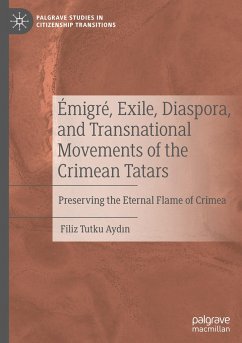
Émigré, Exile, Diaspora, and Transnational Movements of the Crimean Tatars
Preserving the Eternal Flame of Crimea
Versandkostenfrei!
Versandfertig in 6-10 Tagen
106,99 €
inkl. MwSt.
Weitere Ausgaben:

PAYBACK Punkte
53 °P sammeln!
This book explains the unexpected mobilization of the Crimean Tatar diaspora in recent decades through an exploration of the exile experiences of the Crimean Tatars in Central Asia, Middle East, Eastern Europe, and North America. This book adds to the growing literature on diaspora case studies and is essential reading for researchers and students of diasporas, migration, ethnicity, nationalism, transnationalism, identity formation and social movements. Moreover, this book is relevant both for specialists in Crimean Tatar Studies and for the larger fields of Communist, Post-Communist, Middle E...
This book explains the unexpected mobilization of the Crimean Tatar diaspora in recent decades through an exploration of the exile experiences of the Crimean Tatars in Central Asia, Middle East, Eastern Europe, and North America. This book adds to the growing literature on diaspora case studies and is essential reading for researchers and students of diasporas, migration, ethnicity, nationalism, transnationalism, identity formation and social movements. Moreover, this book is relevant both for specialists in Crimean Tatar Studies and for the larger fields of Communist, Post-Communist, Middle Eastern, European, and American studies.














